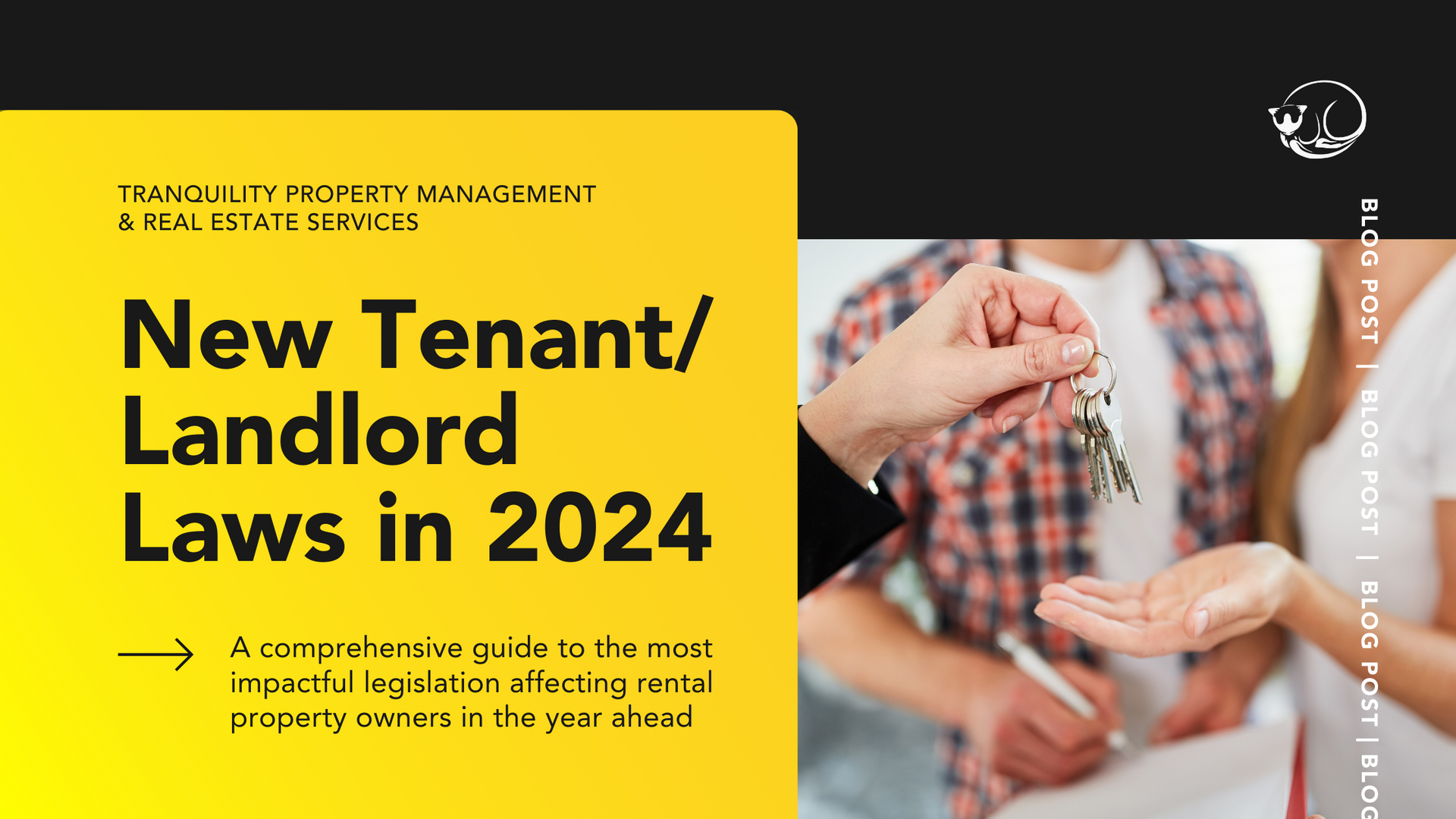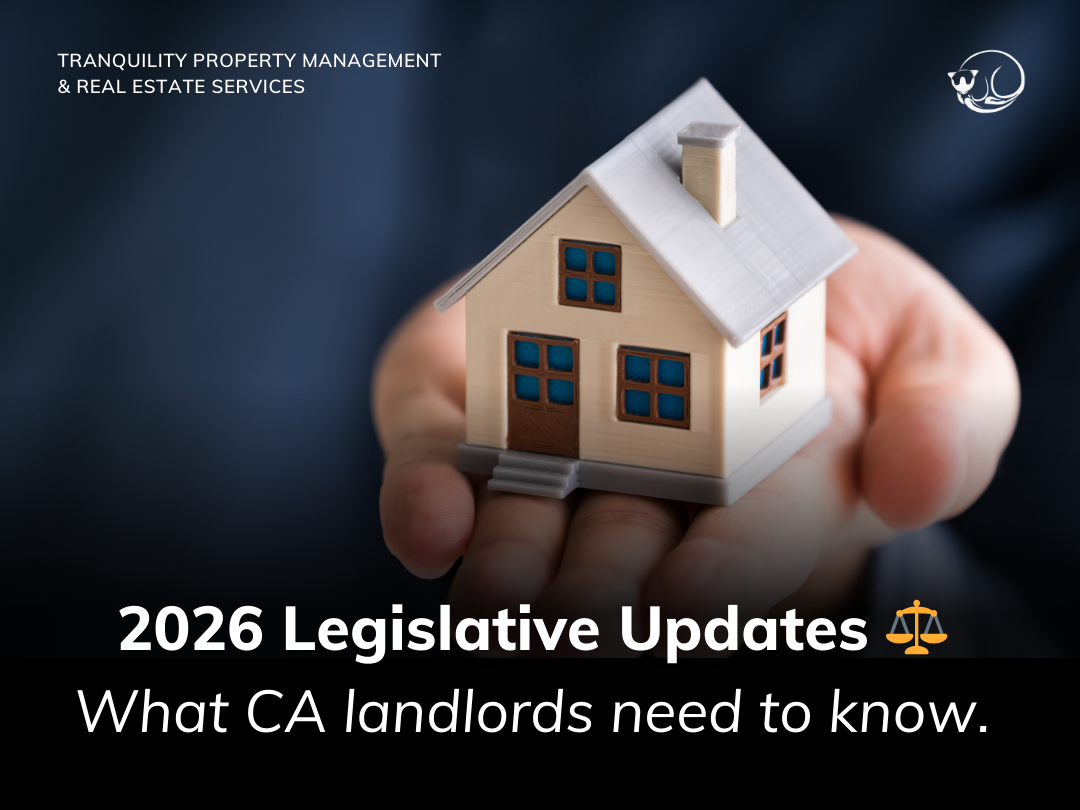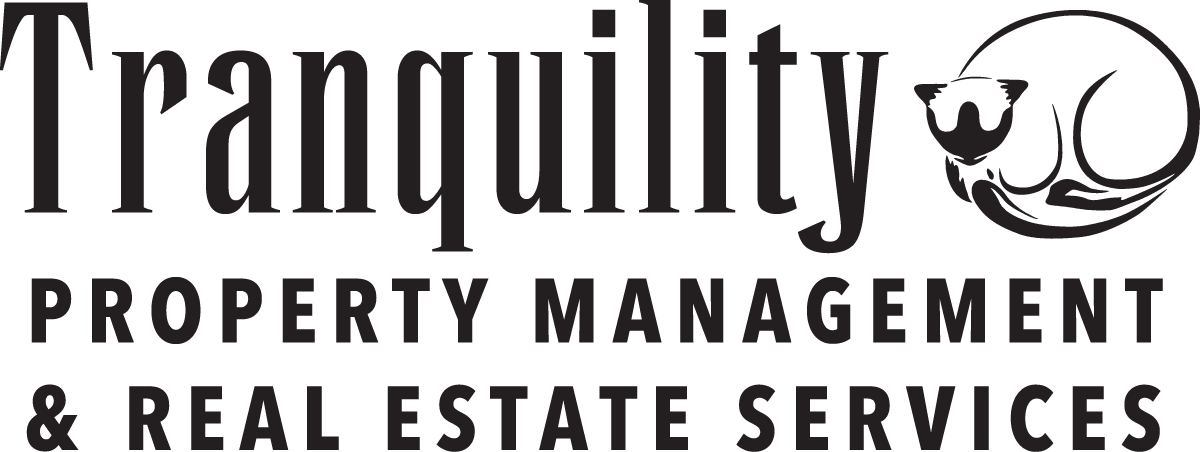New Laws Affecting Landlords in 2024
A comprehensive guide to the most impactful legislation affecting California rental property owners in the year ahead.

Happy New Year!
As we begin another year together, I first want to thank all of you for continuing to trust us with the enhancement of your properties and the care of your tenants. It remains our privilege to serve as your trusted real estate management partner, and we look forward to another year working together.
There are, as usual, new laws taking effect in 2024. I’m highlighting just a few here. If you would like to gain a more comprehensive overview, we would encourage you to join the California Apartment Association (caanet.org). They are an excellent resource.
SB-267:
Effective January 1, for those applicants receiving a government subsidy (for example, Section 8 housing vouchers), rental housing providers are prohibited from using those applicants’ credit history as part of the application process without offering the applicant the option, at the applicant’s discretion, of providing lawful, verifiable alternative evidence of the applicant’s reasonable ability to pay the portion of the rent to be paid by the tenant, including, but not limited to, government benefit payments, pay records, and bank statements.
AB-1418:
Also effective January 1, local governments are prohibited from imposing a penalty against residents or rental housing providers as a consequence of summoning law enforcement. The law also prohibits local governments from requiring a rental housing provider to conduct a criminal background check on a tenant or prospective tenant. While we know of no local government in San Diego County with such a requirement, this law specifically deals with the rights of prior incarcerated individuals. A prior criminal history cannot be used in California to disqualify a potential renter which is why we do not perform criminal background checks on applicants.
SB-567:
Effective April 1, the Tenant Protection Act which put in place statewide rent control and just-cause eviction protections will be modified in the following ways:
- If a rental housing provider intends to evict a resident in order to remove the rental unit from the market and occupy the unit, that rental housing provider will be required to occupy the unit for a minimum of 12 continuous months as their primary residence;
- If a rental housing provider intends to evict a resident in order to “substantially remodel or demolish” the unit, that rental housing provider must provide their residents with written notice stating:
- A description of the substantial remodel to be completed,
- The expected duration of the repairs or the expected date the property will be demolished,
- Including a copy of all necessary permits required to undertake the substantial remodel or demolition. (Meaning you will need to have permits in hand prior to serving the resident their statutorily required notice of eviction)
- Penalties:
- Rental housing providers who violate these updated provisions shall be liable to the resident in a civil action for damages of up to 3 times the actual damages, in addition to punitive damages and injunctive actions by local authorities.
- Additionally, if a rental housing provider attempts to collect rental amounts in excess of the statewide rental cap, they will be liable for damages up to 3 times the amount by which any payment demanded, accepted, received, or retained exceeds the maximum allowable rent, as well as injunctive actions by local authorities.
AB-12:
Effective April 1, rental housing providers are prohibited from demanding or receiving security deposits greater than one month’s rent, in addition to any rent for the first month paid on or before initial occupancy, unless the rental housing provider:
- is a natural person or a limited liability corporation in which all members are natural persons and
- owns no more than 2 residential rental properties that collectively include no more than 4 dwelling units offered for rent.
When this takes effect, we will no longer be able to collect additional deposits for pets. Instead, we will most likely be implementing monthly “pet rent” as an alternative. We will have new policies in place, based on all available tools and best practices prior to April 1 and will inform you of those policy changes in a subsequent email.
After reading all this, you may be wondering, “Why do all these new laws keep tilting in favor of tenants?” There is no simple answer. The factors of politics, demographics, the relatively high ratio of renters to homeowners, and concerns about a lack of affordable housing all contribute. Nevertheless, we feel that there’s no better place to live than California (although we’re probably a bit biased) and property ownership and owning rental properties is, and will remain, a lucrative business. For our part, we will continue to be your trusted partners, advocating for trust, fairness, open communication, and mutual benefit. It’s no coincidence these are also the values that underpin Tranquility Property Management.
We’re in this together.
Recent Posts
Share this post















